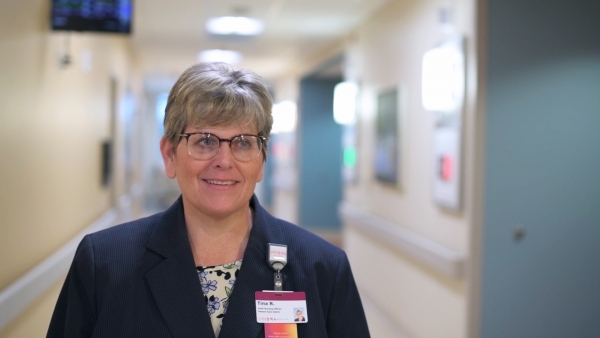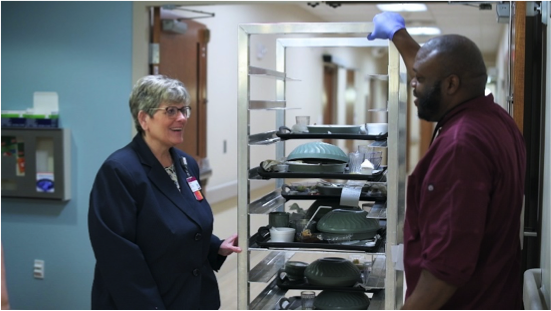Perspectives
Celebrating Nursing Leadership: A Conversation with Tina Ralyea
A contemporary and caring nursing leader, Tina Ralyea, DNP, MBA, MS-NP, CNL, OCN, CCRN serves as the Chief Nursing Officer for Baptist and Baptist Parkridge Hospitals, part of Prisma Health in Columbia, South Carolina. With a DNP, MBA, MS- Nurse Practitioner Adult Health and a background in critical care, Tina’s career has spanned working at the bedside, building and restructuring clinical programs and teaching master’s level nursing courses in population health and evidence-based care. In her latest endeavor, Tina is co-editor for both the 2019 American Journal of Nursing Book of the Year, Population Health for Advanced Practice Providers, and DNP Projects, which will be released this year. Amid leading her hospitals and teams to care for their communities in response to COVID-19, we were fortunate to catch-up with Tina virtually to exchange ideas about nursing and leadership.

IP: What inspired you to become a nurse?
TR: When I was a teenager, I thought I wanted to be an accountant because I love math, but by my junior year of high school I quickly knew that accounting would not be fulfilling. At the time, I was working at a greenhouse and nursery and a lovely elderly lady, who also worked there, had a heart attack while at work. My brother and I had to start CPR until the ambulance and emergency response arrived. Ms. “Lillian” survived, and it was at that moment that I knew I wanted to help others. That’s when my passion for critical care all started. I cannot imagine any other path or direction for my life. Nursing is the best profession for me. It offers many choices and there is so much gratitude and peace in the work nurses do each day.
IP: Today, you are the Chief Nursing Officer at Prisma Health Baptist and Prisma Health Baptist Parkridge Hospitals. How are you advancing the nursing practice at your organization?
TR: Every day, I support nursing having a voice to make decisions in practice to drive change and lead excellence. For example, when I was rounding on our oncology unit, several nurses noted they wanted to take the oncology certification nurse examination. Their nurse manager and I supported a grant proposal, which was approved to support two different review classes. As a result, these nurses became certified and we increased the number of certified RNs on the unit. Several more nurses will now sit for the exam in 2020.
IP: Nurses Week is a special time where we celebrate nurses and the critical role they play in caring for patients. Given the current pandemic, is Nurses Week more important than ever? If so, why?
TR: Every day is nurses day during the pandemic. Every healthcare worker is a hero. This year, Nurses Week will be different with continued social distancing. While we have had to delay several events, we are holding a virtual town hall meeting to thank nurses for their commitment to and excellence in nursing practice. Nursing teams are taking various photos in capes with hero backdrops. The photos will be displayed in a slide show during Nurse’s Week on all nursing units. We are celebrating the accomplishments and the memories made. The entire healthcare team has been superior throughout the healthcare challenges with the pandemic, they truly are creating memories for the “2020 Year of the Nurse”.
IP: As a senior nursing leader, how are you keeping nurses across Prisma Health engaged in their work? How are you ensuring their well-being – mentally, physically and financially?
 TR: Excellent communication, early and often, helps to minimize the fears and stress. Just like with patients, keywords are critical, and the same practice is necessary with the nursing team. The word adaptability for example, as the changes come quickly during this rapid evolution of the pandemic is used frequently.
TR: Excellent communication, early and often, helps to minimize the fears and stress. Just like with patients, keywords are critical, and the same practice is necessary with the nursing team. The word adaptability for example, as the changes come quickly during this rapid evolution of the pandemic is used frequently.
Little things make a difference – things such as continuing daily rounds and being visible for the team, hanging signs of thanks and appreciation around the hospital to let our teams know they are valued and making a difference. To lead effectively in these times, I think it’s important to engage the entire healthcare team. Nursing cannot do this alone – every discipline is essential. At the end of every day, I send many eCards to nurses to thank them for their teamwork and dedication. Additionally, we work with our chaplain and Employee Assistance Program (EAP) partners to support our nursing teams. They can set up virtual group sessions, face time into a shift huddle and are also available for private sessions. It is important to utilize all our resources to help our team.
IP: For nurses who aspire to transition from direct patient care to a management or senior leadership role, what advice would you give them in developing their careers?
TR: First, I believe everyone is a leader. For those who want to advance to formal leadership roles, I encourage them to find a mentor. Be open to feedback. Don’t put up the wall when you receive constructive feedback. Be open and learn from each situation. Reflect and challenge yourself. Consider what you could do better or different next time. Never be afraid to ask questions and take risks. If your manager asks you to take on a stretch project, take the opportunity to improve a process. Always say “yes”.
Remember, you do not need to have all the answers. Try and surround yourself with people. Listen to others, be observant. We can learn from the best and the worst. Keep an open mind. Know that a failure can support many lessons and learning. Build confidence and trust yourself to take the next steps. Do not be afraid, take that next step.
IP: When you think about the future of nursing practice, how will it be different? Do nurses need to develop new skills to care for patients effectively? How has COVID-19 impacted the way you think about the way nurses care for patients?
TR: With COVID-19, I have seen so much teamwork and many nurses pulling together to support each other. Nurses will have a stronger bond and continue collaborating with utmost respect for each other. Nurses will continue to be innovative and focused on their patients, professional practice and excel in caring for each other on the team. I believe this will create a stronger focus on teammate safety and assuring ongoing readiness for future emergencies and critical situations.
The stories that touch my heart include: the newer nurse who expressed concerns that she was going to leave nursing because she did not want to take COVID-19 home to her family and yet days later when it was her turn to care for her first positive patient, she donned her PPE and went into the room. The fear on the patient’s face, that she wasn’t going to get better and that she could not have visitors, quickly made the nurse realize her calling and why she is a nurse. These moments rejuvenate and remind us why we chose this valued profession.
IP: In executive recruiting, we are focused on discovering talented leaders for our customers. When you think about talent, what attributes should organizations look for in nursing executives?
TR: You should always look for leaders who focus on building strong teams that are patient centric. This is a top priority. Additionally, the nurse executive must have the ability to balance vision with organizational priorities. The nurse executive must lead a team that manages the current reality while building capacity for a better future.
IP: Thank you Tina for your leadership and passion for service. Happy Nurses Week!
InveniasPartners is proud to have served Prisma Health in the recruitment of Tina Ralyea as CNO, Baptist and Baptist Parkridge Hospitals.

